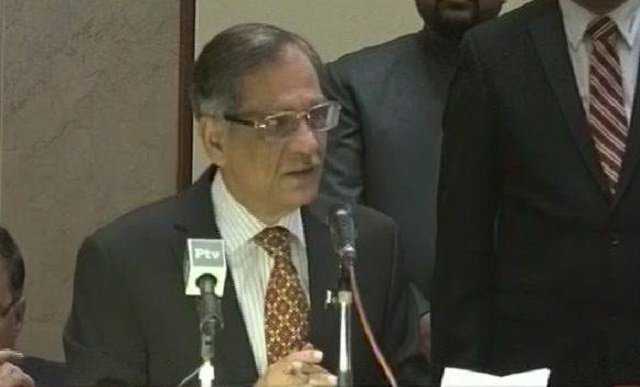
“If the money is sent abroad without justification then it will be disastrous for the country,” the CJP observed on Wednesday while heading a three-judge bench, hearing a suo motu case pertaining to laundered money in Swiss accounts.
“Can the Supreme Court impose a ban on opening of foreign currency accounts?” he asked. Justice Umar Ata Bandial, a member of the bench, also observed that there is a need to amend the law.
The bench noted that FBR had failed to identify the people who had secreted their money in offshore accounts in international tax havens as revealed by the Panama Papers. The bench later appointed Shabbar Zaidi and Mahmood Mandviwalla as amicus curiae in the case.
The matter will now be taken up on March 20 at the SC Karachi Registry.
The court had earlier set up a three-member committee – comprising the State Bank of Pakistan (SBP) Governor Tariq Bajwa, the FBR Chairman Tariq Pasha and Finance Secretary Arif Ahmed Khan – to find a way to ‘trace and bring back to Pakistan bank accounts and properties held abroad’.
The committee has submitted its report, in which different suggestions are given to bring the money lying in foreign accounts back to Pakistan.
The committee recommended amending law to prohibit deposit of foreign exchange purchased from domestic exchange companies in foreign currencies accounts in Pakistan. It has also proposed to amend the law to restrict the movement of foreign currency in cash without any declaration.
NAB references: Hussain Nawaz's bank account details presented before court
It observed that section 111 (4) (a) of the Income Tax Ordinance 2001 provides immunity without any limit to the foreign exchange remittances brought in Pakistan through normal banking channels.
“While appreciating the objective of facilitating the remittances, the committee feels that the immunity should be capped to a reasonable amount to disallow the use of this channel for laundering of money.
“The committee feels that steps will be substantially curtailing the outflow of foreign exchange in future and international developments strengthen the capacity of government agencies to locate and repatriate hidden assets abroad,” it said.
The committee, however, acknowledged that these efforts may not trace all the foreign assets, adding that people holding these assets would expectedly try to use evasive methods to make it difficult to trace them.
“There is growing strong perception that authorities in Pakistan may have access to foreign assets abroad because of liberal and multilateral treaties and realisation strengthen by suo motu of the court that there is seriousness not witnessed before to address this issue, the committee feels that this is good time to provide some incentive to Pakistan citizens to voluntarily declare their assets and repatriate them to Pakistan wherever possible,” it said.
NAB files two supplementary references against Sharif family in accountability court
The committee said it strongly feels that coordination and exchange of ideas in the meetings of the committee have been very useful and will help in chartering future course of action for all the relevant agencies.
"The committee, therefore, is of the view that this forum constituted by the SC should be made permanent to ensure enhanced level of coordination between various stakeholders.
"The committee, therefore, intends to recommend the federal government to notify the committee as permanent forum with mandatory requirement to hold at the least quarterly meetings.”
The panel said it examined the efforts being made by relevant agencies to trace and retrieve assets held abroad by Pakistani citizens and found that lack of specific information is the major hurdle in this respect.
"The committee recommends that all relevant agencies should make use of these developments in future to strengthen their drive for tracing and retrieval of foreign assets," it added.

1731476617-0/Sandra-Oh-(2)1731476617-0-165x106.webp)















COMMENTS
Comments are moderated and generally will be posted if they are on-topic and not abusive.
For more information, please see our Comments FAQ